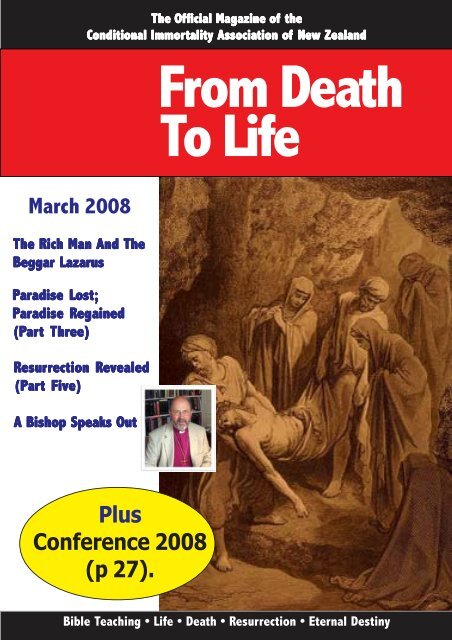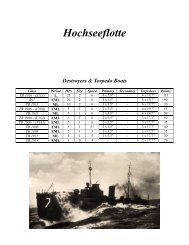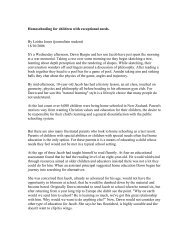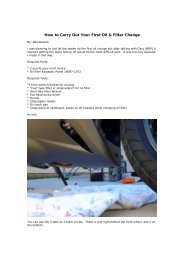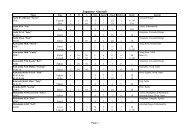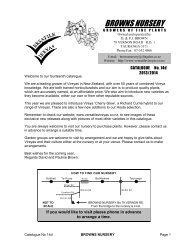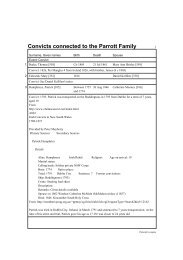Here - Slingshot
Here - Slingshot
Here - Slingshot
You also want an ePaper? Increase the reach of your titles
YUMPU automatically turns print PDFs into web optimized ePapers that Google loves.
The Official Magazine azine of the<br />
Conditional Immortality<br />
Association of New Zealand<br />
From Death<br />
To Life<br />
March 2008<br />
The Rich Man And The<br />
Beggar Lazarus<br />
Par<br />
aradise adise Lost;<br />
Par<br />
aradise adise Regained<br />
(Par<br />
art Thr<br />
hree)<br />
Resur<br />
esurrection ection Revealed<br />
ealed<br />
(Par<br />
art t Five)<br />
A Bishop Speaks Out<br />
Plus<br />
Conference 2008<br />
(p 27).<br />
1 www.afterlife.co.nz<br />
Bible Teaching • Life • Death • Resurrection • Eternal Destiny
www.afterlife.co.nz 2
Editorial Contents<br />
Every issue of this magazine is a<br />
team effort. Even when the<br />
name “David Burge” appears in<br />
the list of contents more often<br />
than it should, it has been a<br />
team effort. The article “A<br />
Bishop Speaks Out” is based on<br />
an article I read because a<br />
friend, knowing it would interest<br />
me, took time to share it.<br />
Beryl Ching continues to share<br />
her thoughts on resurrection - so<br />
appropriate over Easter. Armand<br />
Newrick finishes his interesting<br />
“trilogy”. Armand is to be our<br />
keynote speaker at Conference<br />
this year. I am excited about<br />
what he plans to share with us<br />
(See p 27). These two are a vital<br />
part of our team.<br />
Please join our team. Write to<br />
us. Encourage someone new to<br />
read the Mag. At this time of<br />
year we send out subscription<br />
notices.This is one way you too<br />
can be part of the team.<br />
David Burge.<br />
Issue 37<br />
March 2008<br />
Editorial 3<br />
David Burge<br />
Twisted Scripture 4<br />
The Rich Man and The<br />
Beggar Lazarus (Part 1)<br />
Warren Gray<br />
Paradise Lost; Paradise<br />
Regained (Part Three) 8<br />
Armand Newrick<br />
Resurrection Revealed<br />
(Part Five) 13<br />
Beryl Ching<br />
From Off The Shelf 20<br />
David Burge<br />
This Is My Story:<br />
A Resurrection Story 24<br />
Tony Callaghan<br />
A Bishop Speaks Out 28<br />
David Burge<br />
Info / Adverts<br />
ACMissioNZ 2<br />
From Death To Life 7<br />
Conference 2008 31<br />
From Death To Life (Vol. 1) 32<br />
Editor: David Burge:<br />
respublishing@slingshot.co.nz<br />
3<br />
www.afterlife.co.nz
T<br />
w<br />
i<br />
s<br />
t<br />
e<br />
d<br />
S<br />
c<br />
r<br />
i<br />
p<br />
t<br />
u<br />
r<br />
e<br />
The Rich Man<br />
And The Beggar<br />
Lazarus (Part 1)<br />
By Warren Gray<br />
The following article is<br />
based on a sermon<br />
preached by Warren at the<br />
Takanini Church of Christ<br />
more years<br />
ago than he<br />
cares to<br />
remember.<br />
The<br />
sentiments<br />
expressed<br />
herein are still<br />
relevant today.<br />
In a<br />
television<br />
interview in<br />
1978 Billy<br />
Graham was<br />
heard to say<br />
that when we die we are<br />
carried away by angels.<br />
There is only one passage of<br />
Scripture on which this<br />
strange thought could be<br />
based and that is the<br />
Parable of the Rich Man and<br />
the Beggar Named Lazarus<br />
(Luke 16:19-31). <strong>Here</strong> we<br />
are told of a beggar who<br />
died and was carried by the<br />
angels to Abraham’s bosom<br />
(v. 22).<br />
www.afterlife.co.nz 4<br />
Jesus had just told the Pharisees<br />
the Parable of the unjust Steward.<br />
Those Pharisees who had been<br />
listening to Jesus were covetous,<br />
they were lovers of money, and<br />
they openly derided Jesus.<br />
The Pharisees were convinced of<br />
two things:<br />
1. That according to God’s<br />
Covenant made with Abraham, in<br />
Genesis 12:1-3 and<br />
enlarged upon in<br />
other Scriptures,<br />
they as descendants<br />
of Abraham where<br />
heirs to the<br />
kingdom,<br />
guaranteed a place<br />
in the world to<br />
come.<br />
2. That, in this life,<br />
material wealth was<br />
the supreme sign of<br />
God’s favour.<br />
This parable in Luke 16 was<br />
designed to refute such<br />
convictions.<br />
CHILDREN OF THE<br />
FATHER<br />
Three times in John 8 the Jews<br />
confronted Jesus stating that they<br />
were Abraham’s descendants.<br />
Jesus answered, "I know you are<br />
Abraham's descendants. Yet you<br />
are ready to kill me, because you<br />
have no room for my word" (v. 37)
and "If you were Abraham's<br />
children ... then you would do the<br />
things Abraham did" (v. 39).<br />
God’s covenant was with<br />
Abraham and his descendants.<br />
Abraham kept his side of the<br />
bargain. The record of his<br />
progeny, however, was, like the<br />
record of the rest of humanity,<br />
dismal. Many times the Jews failed<br />
to heed God’s Word. When at last<br />
God sent his Son to inaugurate a<br />
New Covenant the vast majority of<br />
the people refused to accept him.<br />
Hence the warning to the Scribes<br />
and Pharisees in Matthew 23:33,<br />
“"You snakes! You brood of vipers!<br />
How will you escape being<br />
condemned to hell? [Gehenna]",<br />
where Gehenna is symbolic of the<br />
Second Death of Revelation<br />
20:14-15.<br />
5<br />
WEALTH AND GOD’S<br />
BLESSING<br />
Now in the beginning of our<br />
parable two characters are<br />
identified, one a rich man and<br />
the other a beggar named<br />
Lazarus. Both die. Lazarus is<br />
carried by angels to<br />
“Abraham’s bosom”. The rich<br />
man was buried.<br />
What is interesting<br />
here is that Jesus<br />
seems to identify the<br />
Pharisees with the<br />
rich man. The Law<br />
commanded, “You<br />
shalt not covet”<br />
(Exodus 20:17) and<br />
it appears that the<br />
Pharisees were guilty<br />
of this sin. To amass<br />
great wealth under a<br />
cloak of religion is<br />
highly esteemed<br />
among the people of<br />
this world, but it is<br />
useless for such a one to hope<br />
to escape the judgement of<br />
the Law. Jesus Christ, the<br />
great law giver, he himself<br />
threw aside the veil which hid<br />
the abyss of eternal<br />
punishment and judgement<br />
and revealed the doom of the<br />
self righteous, self indulgent<br />
transgressor.<br />
www.afterlife.co.nz
THE TRADITIONAL<br />
VIEW<br />
No one ever spoke so plainly<br />
about hell as did the Lord<br />
Jesus. Some therefore have<br />
drawn a number of<br />
conclusions about “hell” from<br />
this parable, as to:<br />
Its Locality - That it is a real<br />
place in the heart of the earth;<br />
Its Corporeality - The rich<br />
man is represented as having<br />
eyes, ears, a mouth, a tongue<br />
and a tortured body.<br />
It’s Intelligence - The rich<br />
man is able to converse. He<br />
remembers his past life. He<br />
recognises Abraham and<br />
Lazarus and is acquainted with<br />
Moses and the Prophets.<br />
Its Torment - It is asserted<br />
four times that the rich man is<br />
in torment.<br />
Its Eternity - Three times in<br />
the parable the rich man<br />
appeals to Abraham as his<br />
father. Abraham owns the<br />
relationship and calls him son,<br />
but he is powerless to help<br />
because there is now an<br />
impassable gulf between them.<br />
It is said that it is easy to step<br />
into hell but that it is impossible<br />
to step out. There is a great<br />
gulf there that cannot be<br />
crossed. In the parable, the rich<br />
man, it is said, repented too<br />
late. His concern for his<br />
brothers shows how effectively<br />
his conscience was aroused but<br />
he remains a prisoner in that<br />
dreaded dungeon, Hades.<br />
A PRELIMINARY<br />
ASSESSMENT<br />
What is evident from this<br />
parable is that these two men<br />
are supposed to have died.<br />
What is also obvious is that<br />
Jesus in this parable alludes to<br />
what was the popular belief<br />
about death among the<br />
Pharisees. In telling the Parable<br />
of the Rich Man and Lazarus<br />
Jesus appears at first to lend<br />
his support to such beliefs. Can<br />
www.afterlife.co.nz 6
we say that this is the view that<br />
Jesus himself holds?<br />
To this we answer emphatically,<br />
No. It is not! In Ecclesiastes we<br />
read, "Whatever your hand finds<br />
to do, do it with all your might,<br />
for in the grave, [Hebrew,<br />
Sheol, the equivalent of the<br />
Greek, Hades] where you are<br />
going, there is neither working<br />
nor planning nor knowledge nor<br />
wisdom." (Eccl. 9:10).<br />
In Part 2 to follow we will see<br />
that the Scriptures are the Word<br />
of God and that this parable is<br />
the authentic word of Jesus and<br />
at the same time see that the<br />
Scriptures do not teach and<br />
Jesus did not believe the<br />
“traditional view of hell.<br />
The Author<br />
From Death To<br />
Life<br />
This newsletter was<br />
produced, printed and<br />
published by:<br />
Resurrection<br />
Publishing<br />
PO Box 202-162<br />
Southgate<br />
Takanini 2246<br />
New Zealand<br />
Subscriptions may be<br />
sent to the above<br />
address in the amount of<br />
NZ $15 for four issues or<br />
the magazine may be<br />
accessed for free via the<br />
internet at http://<br />
www.afterlife.co.nz/<br />
magazine/magazine.htm<br />
Warren and Shirely Gray are<br />
married and have three adult<br />
children. The above photo shows<br />
Warren and Shirley being presented<br />
with a gift to celebrate their being<br />
“foundation members” of the<br />
Takanini Church of Christ. Warren<br />
was an elder in the Church for<br />
many of those years.<br />
7<br />
www.afterlife.co.nz
Paradise Lost; Paradise<br />
Regained (Part 3 of 3)<br />
By Armand Newrick<br />
In our final instalment we<br />
examine the final two New<br />
Testament references to<br />
paradise in pursuit of a biblically<br />
informed theology.<br />
2.<br />
Rev. 2:7 “…To him who<br />
overcomes, I will<br />
give the right to eat<br />
from the tree of life,<br />
which is in the<br />
paradise of God.”<br />
Is the writer John<br />
suggesting to us that<br />
paradise is an<br />
intermediate state?<br />
Obviously not!<br />
John is writing to<br />
the church in<br />
Ephesus in the first<br />
century about the<br />
tree of life which<br />
comes into view, at the end of<br />
the Revelation, as a glimpse into<br />
the end of the age. In the final<br />
chapters of the Revelation we<br />
see that the New Jerusalem has<br />
come down from heaven and<br />
John is shown the “river of the<br />
water of life” flowing out from<br />
the throne. On its banks is the<br />
tree of life from which the leaves<br />
are taken for the healing of the<br />
nations. When Adam and Eve<br />
were expelled from the Garden<br />
of Eden they were driven from<br />
the tree of life “lest they take<br />
and eat and live forever.” As a<br />
consequence, humanity has<br />
shared in the mortal nature that<br />
resulted from Sin. In the<br />
Revelation it<br />
appears that<br />
paradise is closely<br />
associated with<br />
the tree of life,<br />
hence immortality.<br />
It is interesting to<br />
note that in the<br />
quote from Esdras<br />
8:52 the writer<br />
also equates<br />
paradise with the<br />
tree of life.<br />
In putting our<br />
two New<br />
Testament verses together so<br />
far, one might ask, was Jesus<br />
redefining the imported idea of<br />
paradise as the conditional<br />
possession of immortality<br />
through faith in him? So far I<br />
believe our New Testament<br />
evidence is pointing strongly in<br />
that direction. However, our<br />
third and final reference from<br />
www.afterlife.co.nz 8
the New Testament may be a<br />
difficult one from which to<br />
convince that paradise is a term<br />
pointing to the coming Kingdom<br />
at the end of the age, rather<br />
than pointing to a place for<br />
disembodied spirits.<br />
3.<br />
2 Cor.12:3-4 “ And I know that<br />
this man-whether in the body or<br />
apart from the body I do not<br />
know, but God<br />
knows- was<br />
caught up to<br />
paradise.”<br />
Does this<br />
reference to<br />
paradise by the<br />
Apostle Paul<br />
overturn our<br />
study so far?<br />
Some may<br />
contend that it<br />
does. If so, then<br />
we must<br />
acknowledge that<br />
we have placed a huge amount<br />
of confidence into one single<br />
reference as support for our<br />
accepted tradition on paradise.<br />
If this reference is teaching us<br />
that paradise is an intermediate<br />
state, then it is teaching us that<br />
it is not a subterranean world<br />
but one that is in the “third<br />
heaven” (v.2).<br />
What is the third heaven? Such<br />
an understanding of heaven as<br />
a number of different levels is<br />
no where else found in the<br />
Bible, yet it was a concept in the<br />
Jewish writings. Is this actually<br />
what Paul (or the man of<br />
fourteen years ago v.2) was<br />
experiencing, or was he<br />
interpreting the experience<br />
through his Jewish world view,<br />
after all, Paul was unsure as to<br />
whether this man<br />
was in the body or<br />
out of it. Paul is<br />
not teaching us a<br />
definite truth, but<br />
in some respects<br />
an interpretation of<br />
the experience. We<br />
must clearly note<br />
that this man was<br />
not dead! Does<br />
this leave some<br />
room for concepts<br />
that have been<br />
defined by others<br />
as the “transmigration of the<br />
soul”? Or would it be more<br />
appropriate to assume that this<br />
man was caught up in a vision?<br />
When seeking to determine a<br />
biblically accurate definition on<br />
any theme or topic I believe it is<br />
wise to consider how a single<br />
difficult verse might be<br />
accommodated within the<br />
9<br />
www.afterlife.co.nz
framework of the rest of<br />
scripture, rather than allowing<br />
the single verse to overturn<br />
everything else. So, in the case<br />
of this verse, I<br />
am going to<br />
put forward a<br />
possible<br />
interpretation<br />
of what Paul is<br />
describing.<br />
In the book<br />
of Daniel ch.7,<br />
Daniel had<br />
dreams and<br />
visions pass<br />
through his<br />
mind as he<br />
was lying on<br />
his bed. In<br />
those visions<br />
Daniel saw<br />
kingdoms<br />
come and go<br />
until he saw<br />
the “saints of<br />
the most<br />
high”<br />
receiving the<br />
promised<br />
Kingdom<br />
which they<br />
will posses<br />
forever and<br />
ever. The same questions that<br />
the Apostle Paul asked might be<br />
asked of Daniel; was he in the<br />
body or out of the body? From<br />
what Daniel describes, we see<br />
that he has been transported to<br />
the future to view God’s people<br />
possessing the Kingdom at the<br />
end of the<br />
age.<br />
What did the<br />
Apostle Paul<br />
view? Paul<br />
tells us that<br />
“this man<br />
heard<br />
inexpressible<br />
things that<br />
man is not<br />
permitted to<br />
tell” (v.4).<br />
Unfortunately<br />
this does not<br />
help us too<br />
much, for if<br />
Paul could<br />
describe for<br />
us what this<br />
man saw, we<br />
might be able<br />
to determine<br />
whether he<br />
was glimpsing<br />
a present<br />
tense<br />
intermediate<br />
state, or being<br />
given a<br />
glimpse of the future Kingdom<br />
in the age to come. Similarly, in<br />
Ezekiel 1, while among the<br />
exiles by the Kebar River, the<br />
www.afterlife.co.nz 10
heavens were opened and<br />
Ezekiel saw visions of God. In<br />
those visions Ezekiel was given<br />
glimpses of the immediate<br />
future of Israel, and also of the<br />
distant future. John, in the<br />
Revelation, is caught up in a<br />
vision where the tree of life in<br />
the paradise of God is viewed in<br />
the distant future.<br />
Must we<br />
interpret Paul’s<br />
record of the<br />
man being<br />
caught up to<br />
paradise under<br />
the influence of<br />
the traditional<br />
concept of<br />
paradise as a<br />
place for<br />
disembodied<br />
spirits, or is it<br />
possible that<br />
Paul may be<br />
describing a<br />
glimpse into the<br />
coming<br />
Kingdom of God as Daniel,<br />
Ezekiel and John were given a<br />
glimpse?<br />
Summary<br />
Hopefully we have emerged<br />
from this series realizing that<br />
there is relatively little biblical<br />
reference to paradise to draw<br />
from. It is curiously difficult to<br />
11<br />
explain how so few biblical<br />
references have resulted in such<br />
a powerful tradition of paradise<br />
as an intermediate state for the<br />
deceased. To put it a little<br />
crudely; we might just have<br />
built a mountain out of a mole<br />
hill in our accepted traditions on<br />
Christian hope.<br />
I trust that this study has<br />
regained the<br />
paradise that<br />
has sadly been<br />
lost to tradition!<br />
It would appear<br />
that although<br />
concepts of<br />
paradise were<br />
plentiful in<br />
Jewish thought<br />
outside of the<br />
Bible, it was<br />
Jesus who first<br />
took up the<br />
concept and<br />
redefined it as a<br />
reference to the<br />
Kingdom of God<br />
that might be obtained through<br />
faith in him. The Revelation<br />
clearly associates immortality<br />
through faith in Christ, in the<br />
age to come, through the<br />
imagery of the tree of life which<br />
was lost in the Garden of Eden.<br />
It might just be that God gave<br />
the Apostle Paul a little glimpse<br />
of this; interestingly Paul took<br />
www.afterlife.co.nz
no pride in such visions as if<br />
paradise was some inherent<br />
right, but rather, he chose to<br />
boast in his weaknesses so that<br />
Christ’s power might be evident<br />
in him. It is that very same<br />
power that will raise Paul, along<br />
with all who have placed their<br />
faith in Christ, to posses<br />
immortality in that paradise/<br />
Kingdom of God in the age to<br />
come.<br />
Maranatha!<br />
The Author<br />
Armand<br />
is a<br />
member<br />
of<br />
Manukau<br />
Central<br />
Baptist<br />
church<br />
and a<br />
recent<br />
graduate<br />
from<br />
Carey Baptist College with a<br />
degree in applied theology. He<br />
has had a keen interest in<br />
theology since his teenage<br />
conversion (See Issue 30) and<br />
came to the conditionalist<br />
position about eight years into<br />
his walk with the Lord. He is<br />
married to Suzanne and they<br />
have two children Daniel and<br />
Emma.<br />
And I Quote...<br />
“No biblical text<br />
authorizes the<br />
statement that the<br />
soul is separated<br />
from the body at the<br />
moment of death”<br />
(Interpreter’s<br />
Dictionary of the<br />
Bible, Vol. 1, p. 803).<br />
Katharine Doob Sakenfeld is General Editor<br />
of the New IDB. She is not the author of the<br />
quote above.<br />
www.afterlife.co.nz 12
Resurrection Revealed<br />
RESURRECTION IN THE<br />
PSALMS<br />
The General<br />
Resurrection<br />
In Ps.17:14-15 the Psalmist,<br />
David, contrasts himself with<br />
others. R.V. speaks of the<br />
wicked being satisfied with<br />
children, to whom they leave<br />
their substance. They had<br />
their portion in this life, David<br />
says, but “As for me, I will<br />
behold thy face in<br />
righteousness: I shall be<br />
satisfied, when I awake, with<br />
thy likeness.” Matthew Henry<br />
comments, “When ...the body<br />
awakes, at the resurrection, out<br />
of its slumber...” and goes on<br />
to say that then “blessedness<br />
will consist in three things:- (1)<br />
The immediate vision of God<br />
and his glory....(2) The<br />
participation in his<br />
likeness....(3) A complete and<br />
full satisfaction resulting from<br />
all this:....” 27<br />
In Psalm 49, attributed to<br />
the sons of Korah, death is<br />
spoken of as something<br />
inevitable - the wise, the<br />
foolish, and the brutish all die;<br />
the wealth of the wealthy<br />
Part V<br />
cannot save them; they leave<br />
behind that wealth for others! (v.<br />
10, 17). The psalm even says<br />
that man and beast alike perish<br />
(v. 12). But v. 15 surprisingly<br />
says, “But God will redeem my<br />
soul from the power of the grave:<br />
for he shall receive me.” Note the<br />
change betokened in the words,<br />
“But God...” Hope is ushered in.<br />
“This statement cannot be<br />
restricted to a belief on the<br />
psalmist’s part that God would<br />
preserve him from a premature<br />
death. The whole force of the<br />
revelation (4) lies in the reversal<br />
after death of the distinctions<br />
between the man of God and the<br />
man of this world.” 28<br />
Man<br />
would like to purchase<br />
immortality, and be free from the<br />
13<br />
www.afterlife.co.nz
www.afterlife.co.nz 14<br />
corruption of death<br />
(vv. 7, 9), but he<br />
cannot. But God can,<br />
and will, redeem men<br />
from death and the<br />
grave. From the New<br />
Testament we learn<br />
that it is our Saviour<br />
Jesus Christ who<br />
purchased<br />
immortality for us (2<br />
Tim. 1:10).<br />
In Psalm 68:20,<br />
David uses the<br />
phrase, “Unto God<br />
the Lord belong the<br />
issues from death.”<br />
The Revised Version<br />
translates, “escape<br />
from death”. God is<br />
twice called “the God<br />
of our salvation” (vv.<br />
19, 20). The<br />
commentaries inform<br />
us that this refers to<br />
escape from death.<br />
It may be that David<br />
is thinking of<br />
protection in a<br />
physical manner, but<br />
it remains true that it<br />
is only God the Lord<br />
who can provide for<br />
us the final escape<br />
from death. George<br />
Williams refers to vv.<br />
17 - 20 as “the<br />
resurrection stanza”.
Walter C. Wright says, “The outlook seems to be into the future.<br />
Indeed, the Psalms as a whole would seem to anticipate millennial<br />
conditions and events upon the borderline of the future age.” 29<br />
Again, in Psalm 71 there is an even more definite faith in<br />
resurrection, “Thou...shalt quicken me again, and shalt bring me<br />
up again from the depths of the earth.” (v. 20). The Revised<br />
Version uses the plural, “quicken us again”, “will bring us up<br />
again”. This Psalm is written by an old man (vv. 9, 18), but he<br />
does not see approaching death as the end - there will be a<br />
quickening from the grave!<br />
Ps.73:24 says, “Thou shalt guide me with thy counsel, and<br />
afterwards receive me to glory.” Some translate this, “after the<br />
glory receive me”, or “Thou shalt...lead me on after glory.” Martyn<br />
Lloyd-Jones in his book on Psalm 73 writes, “It means that if we<br />
are thus in God’s hands, and are being sustained by Him, we arrive<br />
at a certain amount of glory even here in this world...Thank God it<br />
is true. Yes, but that is only the beginning; that is only the<br />
foretaste. It is...only after death that we shall arrive perfectly at<br />
the glory that awaits us...” 30<br />
For us to enjoy this promised glory<br />
there must needs be a resurrection.<br />
Psalm 90:5 says that God sweeps men away in death, but<br />
according to the N.I.V. it is the “sleep of death”. Sleep infers an<br />
awakening, as we have already pointed out. (K. J. V.’s meaning<br />
is not so clear - “they are as a sleep”.)<br />
Commenting on Psalm 102:28, “The children of thy servants<br />
shall continue”, (N.I.V. - “The children of your servants will live in<br />
your presence”), John B.Taylor sees an intimation of the<br />
resurrection: “it was a loving God who...will one day enable him to<br />
live for ever in his presence.” 31<br />
The Resurrection of Christ<br />
In other Psalms we find the resurrection of Jesus Christ<br />
prophesied in ways which could not apply to any man.<br />
In Psalm 2:7 Jehovah says, “Thou art my Son; this day I have<br />
begotten thee.” Derek Prince has said in a radio broadcast that<br />
this is prophetic of Jesus’ resurrection. He became the first<br />
begotten on resurrection day. It was a birth out of the dead - He<br />
www.afterlife.co.nz<br />
15
is the first-born from the<br />
dead to eternal life. This is<br />
not to say that He was not<br />
the Eternal Son, but only<br />
that He was manifested to<br />
be so by His resurrection<br />
(Acts 13:33).<br />
In Ps.16:10 we read,<br />
“For thou wilt not leave my<br />
soul in hell; neither wilt thou<br />
suffer thine Holy One to see<br />
corruption.” Regarding this<br />
verse Chafer writes that it<br />
“anticipated the fact that His<br />
body would not see<br />
corruption but would be<br />
resurrected.” 32<br />
This verse<br />
could not apply to the writer,<br />
David. It is quoted in the<br />
New Testament by both<br />
Peter and Paul as applying to<br />
Jesus Christ. Peter used it in<br />
his sermon on the Day of<br />
Pentecost, (Acts 2:27), and<br />
specifically points out that it<br />
could not concern David,<br />
who was dead and buried,<br />
and whose sepulchre was<br />
still with them to that day,<br />
(v. 29). He specifically<br />
states in v. 37 that “David is<br />
not ascended into the<br />
heavens”.<br />
Warren Prestidge writes, “<br />
‘David both died, was buried<br />
and experienced corruption,<br />
like anyone else,’ says Peter.<br />
And that is the nub of his<br />
whole www.afterlife.co.nz argument; that is 16margin).” 35<br />
why this text cannot refer to<br />
David. ‘In its fullness,’ says<br />
Peter, ‘this text, Ps. 16:10,<br />
can only prefigure<br />
resurrection from the dead,<br />
for resurrection is the only<br />
answer to death...But there is<br />
one person, just one, who has<br />
been raised from the dead:<br />
Jesus. This text, then, refers<br />
to Him...’” 33<br />
Paul quoted it in his<br />
message in the synagogue of<br />
Antioch in Pisidia (Acts<br />
13:35), pointing out that<br />
David did see corruption, but<br />
Christ, on the other hand, did<br />
not.<br />
A role in the play called<br />
“The Best Man” has the<br />
character say, “I tell you, son,<br />
I am scared to die...I don’t<br />
fancy being just a pinch of<br />
dust.” But this verse gives us<br />
confidence. Coupled with the<br />
verses before and after it, we<br />
can see, as Walter C. Wright<br />
says, that the Psalmist had<br />
“confidence in God for the<br />
present and the future - in life<br />
and death”. 34 Norman H.<br />
Camp comments: “While this<br />
prophecy refers to the<br />
promised Messiah, yet David<br />
believed it included him, for he<br />
added: ‘I shall be satisfied,<br />
when I awake, with thy<br />
likeness or form’ (Ps. l7:15,
Ps 22 is well-known as a<br />
Psalm prophesying not only the<br />
death of Christ, but the manner<br />
of that death. In v. 21 “the<br />
lion’s mouth” and “the horns of<br />
the unicorn (or wild ox)” signify<br />
death. Then in v. 22 we find a<br />
hint of His resurrection, “I will<br />
Pierson is linking this verse to<br />
the “the ends of the world” (v.<br />
27) and “a people yet to be<br />
born.”. (v. 31). The first half of<br />
the Psalm depicts Christ’s<br />
suffering; the second half, from<br />
v. 21, His glory. J.F.B.<br />
Commentary says of the phrase<br />
declare thy name unto my<br />
brethren: in the midst of the<br />
congregation will I praise thee.”<br />
Only if Christ rises again from<br />
the dead can He fulfil this verse.<br />
“He who is brought into the dust<br />
of death is yet to declare<br />
Jehovah’s name unto his<br />
brethren, in the midst of great<br />
congregations to praise Him...” 36<br />
17<br />
in v. 26, “your heart shall live<br />
for ever”, that the dying of the<br />
heart denotes death, as in 1<br />
Sam. 25:37, “his [Nabal’s] heart<br />
died within him” ), so its living<br />
denotes life. 37<br />
This verse then,<br />
coming after all the verses<br />
describing the Messiah’s death,<br />
infers His resurrection.<br />
www.afterlife.co.nz
In Psalm 110:4 the<br />
prophecy is made of the<br />
Messiah, that He will be a priest<br />
for ever after the order of<br />
Melchizedek. Combined with<br />
prophecies (as above, in Ps.22)<br />
of His death, this becomes a<br />
prophecy of His resurrection.<br />
If we read Psalm 118:22 as<br />
simply a prophecy of the<br />
rejection of Christ, we may miss<br />
the inner meaning - the<br />
rejected stone becomes the<br />
head stone of the corner.<br />
When does this occur? His<br />
rejection resulted in His<br />
crucifixion. His becoming the<br />
head stone of the corner occurs<br />
afterwards. So this infers His<br />
resurrection.<br />
Footnotes<br />
27. Matthew Henry.<br />
28. The New Bible<br />
Commentary. I. V. F.<br />
29. Walter C. Wright. Psalms,<br />
Vol. 2. Moody Press l955, p.20<br />
30. D.Martyn Lloyd-Jones. Faith<br />
on Trial. Good News Literature<br />
Centre, Secunderabad, A.P.,<br />
India, p. 144<br />
31. Scripture Union notes,<br />
“Encounter with God”, 3rd<br />
March, 2002.<br />
www.afterlife.co.nz 18
32. Chafer Vol. 1, p. 230.<br />
33. Warren Prestidge. Life,<br />
Death and Destiny. Resurrection<br />
Publishing, 1998. p.25.<br />
34. Walter C.Wright. Psalms.<br />
Vol.1.<br />
35. Norman Camp. The<br />
Resurrection of the Human Body.<br />
36. A. T. Pierson. Many Infallible<br />
Proofs, p.200.<br />
37. The J. F. B. Bible Commentary<br />
The Author<br />
Beryl Joy Ching, spent over 40<br />
years on the mission field in<br />
India. Returning to New<br />
Zealand to “retire”, Beryl was<br />
for a long time secretary of this<br />
Association. RESURRECTION<br />
AS REVEALED IN THE OLD<br />
TESTAMENT AND CONFIRMED<br />
IN THE NEW TESTAMENT is<br />
the full title of her Thesis<br />
presented to the Faculty of the<br />
Freelandia Institute Biblical<br />
Theological<br />
College in<br />
partial<br />
fulfilment<br />
of the<br />
requirements<br />
for the<br />
Degree<br />
Master of<br />
Biblical<br />
Studies.<br />
19<br />
And I Quote...<br />
“Easter says you can put<br />
truth in a grave, but it won't<br />
stay there.”<br />
~ Clarence W. Hall<br />
The joyful news that He is<br />
risen does not change the<br />
contemporary world. Still<br />
before us lie work,<br />
discipline, sacrifice. But the<br />
fact of Easter gives us the<br />
spiritual power to do the<br />
work, accept the discipline,<br />
and make the sacrifice.<br />
~ Henry Knox Sherrill<br />
Could life so end, half told;<br />
its school so fail?<br />
Soul, soul, there is a sequel<br />
to thy tale!<br />
~ Robert Mowry Bell<br />
We live and die; Christ died<br />
and lived!<br />
~ John Stott<br />
Our Lord has written the<br />
promise of the resurrection,<br />
not in books alone, but in<br />
every leaf in spring-time.<br />
~ Martin Luther<br />
www.afterlife.co.nz
From Off The Shelf<br />
I don’t have nearly as much time to read as I’d like.<br />
Ecclesiastes 12:2 says, "Of making many books there is no<br />
end, and much study wearies the body." One way I have<br />
found to help me keep abreast of whats out there without<br />
“wearing out my body” is to read good book reviews. Those<br />
books that seem particularly interesting - or will be beneficial<br />
to me - I will find at my library and make time to read.<br />
I’m not yet sure if I will get<br />
“God is not Great” or not.<br />
Commenting on “God Is Not<br />
Great”, by Christopher<br />
Hitchens, Anthony Gottlieb<br />
(The New Yorker, May 21,<br />
2007 online at http://<br />
www.newyorker.com/arts/<br />
critics/books/2007/05/21/<br />
070521crbo_books_gottlieb?<br />
current Page=all) Gottlieb<br />
cites Hitchens as recounting<br />
how, a week before<br />
September 11th, a<br />
hypothetical question was<br />
put to him by American<br />
talk-show host Dennis<br />
Prager. "Hitchens was<br />
asked to imagine himself in<br />
a foreign city at dusk, with<br />
a large group of men<br />
coming toward him. Would he feel safer, or less safe, if he<br />
were to learn that they were coming from a prayer meeting?<br />
With justified relish, the widely travelled Hitchens responds<br />
that he has had that experience in Belfast, Beirut, Bombay,<br />
Belgrade, Bethlehem, and Baghdad, and that, in each case,<br />
the answer would be a resounding “less safe.” He relates<br />
what he has seen or knows of warring factions of Protestants<br />
and Catholics in Ulster; Christians and Muslims in Beirut and<br />
in Bethlehem; Hindus and Muslims in Bombay; Roman<br />
www.afterlife.co.nz 20
Catholic Croatians, Orthodox Serbians, and Muslims in the<br />
former Yugoslavia; and Shiites, Sunnis, and Christians in<br />
Baghdad. In these cases and others, he argues, religion has<br />
exacerbated ethnic conflicts. As he puts it, “religion has been<br />
an enormous multiplier of tribal suspicion and hatred.”<br />
This is quite a challenge. Is it true that the name of the Prince<br />
of Peace who died and rose again that we might live forever<br />
has become so associated with death and violence?<br />
IF JESUS HAD NEVER BEEN<br />
The truth is that evil doing is in no<br />
way restricted to those who claim<br />
some sort of "religious" motivation.<br />
There are a number of "black<br />
sheep" in the secular family. More<br />
people have been killed in the name<br />
of Marx and Lenin, for example,<br />
than in the name of Jesus. The line<br />
between good and evil cannot be<br />
drawn between the so-called<br />
“religious” and “secular”. Evil lies<br />
within all our hearts.<br />
And, as noted in What if Jesus Had<br />
Never Been Born? by D. James<br />
Kennedy and Jerry Newcombe, the<br />
followers of Jesus have done an<br />
enormous amount of good in the world.<br />
If Jesus had never been born, women Christopher Hitchens<br />
might still be slaves of free men. The killing of children,<br />
gladiatorial games, slavery and even cannibalism might still be a<br />
part of our common experience. There have always been<br />
Christians showing compassion and mercy to the needy whether<br />
Mother Theresa or the Salvation Army, or those working in<br />
religious hospitals and church supported soup kitchens or thrift<br />
shops in countless communities around the world.<br />
Many more examples of the positive impact that the teaching of<br />
Jesus has had upon the world could be put forth but this is not<br />
21<br />
www.afterlife.co.nz
perhaps really the heart of the<br />
issue. It is a question of fact<br />
not of feeling. It is a matter of<br />
truth not of tradition. Even if<br />
some “religious” people do not<br />
live up to the high moral<br />
standards they teach, or even<br />
if many atheists live “good”<br />
lives, truth is still truth. Fact is<br />
still fact. And so on .<br />
MARK D. ROBERTS’<br />
RESPONSE<br />
In a response to Hitchen's<br />
book by Rev. Dr. Mark D.<br />
Roberts (also found online at<br />
http://<br />
www.markdroberts.com/<br />
htmfiles/resources/<br />
godisnotgreat.htm), Roberts<br />
points out that though the<br />
book purports to be chock full<br />
of facts, in the area where<br />
Roberts feels most competent<br />
to assess the truth of<br />
Hitchen's argument, that of<br />
New Testament studies, there<br />
are a number of insubstantial<br />
and substantial errors.<br />
I had a friend once who<br />
sounded supremely convincing<br />
no matter the subject on which<br />
he put forth. The trouble was<br />
that whenever he spoke about<br />
a subject upon which I was<br />
confident to judge the accuracy<br />
of his statements he was found<br />
wanting. I began to suspect<br />
there was a better than even<br />
chance that those "facts" upon<br />
which I was not competent to<br />
pronounce judgment might be<br />
equally errant.<br />
One area where I feel<br />
competent to pronounce<br />
judgment is in the area of<br />
Jesus’ teaching concerning hell.<br />
“Hitchens is<br />
wrong about<br />
Hell”<br />
HITCHENS WRONG<br />
ABOUT HELL<br />
Roberts quotes Hitchens on the<br />
subject of hell. Hitchens is flatly<br />
wrong when he writes that "...<br />
it is only in the reported<br />
observations of Jesus that we<br />
find any mention of hell and<br />
eternal punishment" (p. 175).<br />
www.afterlife.co.nz 22
Christians may disagree on the nature of hell but all agree that<br />
the idea of a hell (of one kind or another) is very definitely taught<br />
in Scripture by those other than Jesus. Paul (2Thess. 1:6-10),<br />
Peter (2Pet. 2:4-10), Jude (Jude 7), and John (Rev. 20:11-15) all<br />
speak plainly about it.<br />
Hitchens goes further. He writes: "Not until the advent of the<br />
Prince of Peace do we hear of the ghastly idea of further<br />
punishing and torturing of the dead." (p. 175-176). Hitchens is<br />
right to say that the idea<br />
of eternal conscious<br />
torment is not found in<br />
the Old Testament. But<br />
among Jews the idea of<br />
the immediate postmortem<br />
punishment of evildoers<br />
originated in the<br />
intertestamental (“between<br />
the Testaments”)<br />
writings. It certainly<br />
did not originate<br />
with Jesus.<br />
I would say that Hitchens<br />
badly misinterprets the<br />
teaching of John the<br />
Baptist and the "Prince of<br />
Peace" in suggesting that<br />
they themselves support<br />
the notion of eternal<br />
conscious torment. I will<br />
be the first to admit that<br />
it is not only atheists that misunderstand the Bible doctrine of<br />
hell. Many Christians teach a wrong headed doctrine of “hell”.<br />
Such teaching is a barrier between the unbeliever and Christ. The<br />
“Prince of Peace” has been unfairly associated with an idea that<br />
makes all of the sectarian violence of this world look like a Sunday<br />
School picnic. I am pleased, through this Association, to be able<br />
to do my part toward expounding the truth.<br />
23<br />
David Burge<br />
www.afterlife.co.nz
This is My sTory:<br />
A resurrecTion sTory<br />
www.afterlife.co.nz 24<br />
After leaving school in 1956, I<br />
spent 10 years in ex-wharf<br />
cartage before taking a SALES<br />
position in Rail and Sea<br />
containerization. Eight years<br />
on, in this new industry, I<br />
developed a serious heart<br />
condition. Two year after that I<br />
emerged from Greenlane<br />
Hospital with a new aortic<br />
valve.<br />
Fortunately I had previously<br />
started a recycling business<br />
and upon my return to<br />
strength I expanded this<br />
business. It involved<br />
laboriously seeking out cartons<br />
and bags which ordinarily<br />
would have been destroyed. A<br />
brother-in-law, Mark Page, and<br />
his wife Jan, suggested we<br />
were resurrecting packaging<br />
and so we named the business<br />
“Resurrection Packaging<br />
Limited.”<br />
Both Mark and I had<br />
undergone serious life<br />
threatening surgery and in the<br />
‘depths’ had decided to give<br />
over to the ‘Manufacturer’ the<br />
direction for our lives—we<br />
decided to wise up and follow
‘Someone’ who knew what<br />
He was doing. In a word I<br />
was REBORN and emerged<br />
with an evangelical desire to<br />
declare aloud, “I’M GOING TO<br />
HEAVEN AND ‘HELL BENT’ ON<br />
TAKING AS MANY AS I CAN<br />
WITH ME”.<br />
As I said, having named the<br />
business Resurrection<br />
Packaging Ltd, we contracted<br />
Paul Cooney to handle<br />
accounts.<br />
The business grew rapidly.<br />
Buyers were clamouring for<br />
good, low cost packaging.<br />
Sales slogans included: “Have<br />
we got the box to suit you?!”<br />
Every business needs a sales<br />
vehicle and for Resurrection<br />
Packaging Limited a hearse<br />
was an obvious choice. We<br />
found a freshly reconditioned,<br />
black, lowered, mag-wheeled<br />
and curtained, 1965 Ford XP<br />
Falcon SW.<br />
Seven years passed. Another<br />
side of the business was<br />
producing 3 x 2 ply rubbish<br />
bags out of 6 ply mild powder<br />
and casein bags. We later<br />
changed direction and got<br />
into into plastics — the Big<br />
Blak Sak our recycled plastic<br />
rubbish bag has grown to be<br />
New Zealand’s No. 1 selling<br />
refuse bag.<br />
25<br />
www.afterlife.co.nz
“The grave ...<br />
is only a place for<br />
‘SLEEPING’ until the<br />
great awakening of the<br />
dead who have<br />
accepted God’s ‘FREE<br />
GIFT’ of eternal life.”<br />
We have now established two<br />
charitable trusts: M.T.E.C., a<br />
marine training centre for<br />
secondary school pupils<br />
providing Day Skipper courses<br />
and NCEA marine<br />
qualifications; and, New Life<br />
Marketing, helping people into<br />
businesses and providing<br />
professional support—with the<br />
ultimate aim of supporting<br />
missions.<br />
WHY RESURRECTION<br />
FUNERAL SERVICES?<br />
It seemed obvious to us as we<br />
were spawning new<br />
businesses, that we carry on<br />
with the ‘ideas’ that our hearse<br />
ownership fostered, i.e. starting<br />
a genuine funeral service and<br />
encouraging people with the<br />
message of a RESURRECTION<br />
TO ETERNAL LIFE FOR ‘ALL<br />
WHO WILL BELIEVE’. Our<br />
retiring accountant, Paul<br />
Cooney, seemed an obvious<br />
choice to start the service as<br />
his practical experience in this<br />
area has been extensive.<br />
As a Pastor’s son, his gentle<br />
manner adds something unique<br />
to all services he participates in<br />
and we know he will be well<br />
received by all who place their<br />
loved ones in his care.<br />
www.afterlife.co.nz 26
Resurrection Funeral Services<br />
will encourage family<br />
participation in ceremonies with<br />
an ‘air’ of victory and celebration<br />
of life. As one man in the<br />
industry said to us recently: “It<br />
looks like you people have<br />
achieved the ‘ULTIMATE IN<br />
RECYCLING’”.<br />
JOHN 11: 25—26<br />
Jesus said to Martha: “I am the<br />
resurrection and the life. He<br />
who believes in me even though<br />
he die, yet shall he live, and<br />
whoever lives and believes in<br />
me SHALL NEVER DIE”.<br />
The grave therefore, is only a<br />
place for ‘SLEEPING’ until the<br />
great awakening of the dead<br />
who have accepted God’s ‘FREE<br />
GIFT’ of eternal life—good news<br />
huh!! See also John 11:11 and<br />
1 Thess.4:13—17.<br />
Tony Callaghan<br />
Founder<br />
Resurrection Funeral<br />
Services<br />
To contact<br />
Resurrection<br />
Funeral Services<br />
call Paul Cooney,<br />
Managing<br />
Director,<br />
phone 82 92 664<br />
(24 hours).<br />
27<br />
www.afterlife.co.nz
A Bishop Speaks<br />
An article in Time magazine<br />
(Thursday, Feb. 07, 2008) by<br />
David Van Biema was<br />
provocatively titled, "Christians<br />
Wrong About Heaven, Says<br />
Bishop". N.T. Wright is Bishop<br />
of Durham and author of The<br />
Resurrection of the Son of God<br />
(2003), which argued forcefully<br />
for belief in a literal<br />
resurrection of Jesus from the<br />
dead. In the article (online at<br />
http://www.time.com/time/<br />
world/article/<br />
0,8599,1710844,00.html),<br />
Wright had some interesting<br />
things to say.<br />
Wright quotes a children's<br />
book by Maria Shriver called<br />
What's Heaven, as saying<br />
"[Heaven is] a beautiful place<br />
where you can sit on soft<br />
clouds and talk ... If you're<br />
good throughout your life, then<br />
you get to go [there]... When<br />
your life is finished here on<br />
earth, God sends angels down<br />
to take you heaven to be with<br />
him." Wright argues this is a<br />
good example of "what not to<br />
say."<br />
Wright continues, "I've often<br />
heard people say, 'I'm going to<br />
heaven soon, and I won't need<br />
Out<br />
www.afterlife.co.nz 28<br />
this stupid body there, thank<br />
goodness.' That's a very<br />
damaging distortion". He goes<br />
on to show how this kind of<br />
language distorts the teaching<br />
of the New Testament in three<br />
fundamental ways.<br />
A MATTER OF TIMING<br />
N. T. Wright<br />
In what commonly passes for<br />
Christianity the emphasis is on<br />
what happens immediately<br />
upon the death of the believer.<br />
In the New Testament the<br />
emphasis is upon what happens<br />
when the dead are raised at<br />
Christ’s coming again. Although<br />
Wright argues for some kind of<br />
conscious intermediate state he<br />
says "compared with being<br />
bodily alive, it will be like being
asleep." Says Wright, "Paul is<br />
very clear that Jesus Christ has<br />
been raised from the dead<br />
already, but that nobody else has<br />
yet." Thus, when it comes to the<br />
matter of timing, it is Christ first,<br />
then, only at his coming, those<br />
who belong to him (1Cor. 15:23).<br />
OUR PHYSICAL STATE<br />
Again, in what is the commonly<br />
accepted teaching, the emphasis<br />
is upon the incorporeal "soul"<br />
that lives on despite the death of<br />
the body. The New Testament<br />
rather says that "when Christ<br />
does return, the dead will<br />
experience a whole new life: not<br />
just our soul, but our bodies.”<br />
This is the whole point of 1<br />
Corinthians 15 and the reason<br />
why Easter Sunday sounds<br />
such a note of celebration.<br />
THE LOCATION<br />
Wright's final comment<br />
concerns the location of our<br />
reward. "At no point", says he,<br />
"do the resurrection narratives<br />
in the four Gospels say, 'Jesus<br />
has been raised, therefore we<br />
are all going to heaven.' It says<br />
that Christ is coming here, to<br />
join together the heavens and<br />
the Earth in an act of new<br />
creation." This too is found in 1<br />
Corinthians 15 which looks to<br />
the future coming of the<br />
Kingdom of God (v. 50).<br />
IF YOU’RE GOOD?<br />
One bone of contention that<br />
the Bishop does not pick up on<br />
is the notion that “If you're<br />
good throughout your life, then<br />
you get to go [to Heaven]...”<br />
Far from it! Jesus died because<br />
we are not good (1Cor. 15:3).<br />
We are saved not by “good<br />
works” but by believing in that<br />
gospel which Paul preached<br />
and which is fundamental to 1<br />
Corinthians 15. That Jesus is<br />
God’s appointed Messiah -<br />
King, that Jesus died for our<br />
sins, that he was buried, and<br />
that he rose again! (vv. 3-4).<br />
29<br />
www.afterlife.co.nz
WHENCE THE<br />
CONFUSION?<br />
Wright acknowledges that<br />
much confusion originates from<br />
reading into the New<br />
Testament certain "Greek"<br />
ideas. The New Testament he<br />
says "is deeply, deeply Jewish,<br />
and the Jews had for some<br />
time been intuiting a final,<br />
physical resurrection. They<br />
believed that the world of<br />
space and time and matter is<br />
messed up, but remains<br />
basically good, and God will<br />
eventually sort it out and put it<br />
right again. Belief in that<br />
goodness is absolutely essential<br />
to Christianity, both<br />
theologically and morally. But<br />
Greek-speaking Christians<br />
influenced by Plato saw our<br />
cosmos as shabby and<br />
misshapen and full of lies, and<br />
the idea was not to make it<br />
right, but to escape it and leave<br />
behind our material bodies.”<br />
Wright continues, “The church<br />
at its best has always come<br />
back toward the Hebrew view,<br />
but there have been times<br />
when the Greek view was very<br />
influential.” This Association<br />
stands for much of what the<br />
Bishop has to say in this area. I<br />
have always believed that we<br />
have a role to play in bring out<br />
the “best” in the church by promoting<br />
the Hebrew view, and<br />
standing against the influence<br />
of Plato.<br />
David Burge.<br />
www.afterlife.co.nz 30
Conference 2008<br />
CONDITIONAL IMMORTALITY ASSOCIATION<br />
Of<br />
New Zealand<br />
“The Story of Conditional Immortality in the Nineteenth<br />
Century”<br />
The doctrine of “Hell” was once a vital tool in scaring people<br />
into making a decision for Christ during the “Great Awakening”<br />
of the eighteenth century. However, from the nineteenth century<br />
forward it has been a psychological obstacle to the success of<br />
the Gospel!<br />
The nineteenth century advances in the disciplines of science,<br />
philosophy and religion loosened the grip of tradition from<br />
searching minds; finally, hundreds of years of tradition looked<br />
set to be overturned. Yet, on both sides of the Atlantic it was<br />
strangely suppressed by those obsessed with conformity to<br />
tradition rather than a commitment to both biblical truth and a<br />
society whose world view had changed!<br />
Come and hear the story.<br />
When? Saturday May 3 rd Meeting, 5:00pm,<br />
Dinner 6:15pm*.<br />
Where? Barrycourt Conference Centre, 10-20 Gladstone Rd.<br />
Parnell.<br />
Who? Armand Newrick (See page 12).<br />
Cost? $35 (waged) $25 (non-waged) $20 (theological<br />
students).<br />
R.S.V.P. Resurrection publishing, P.O. Box 202-162, Southgate,<br />
Takanini 2246 by Friday April 18.<br />
Sponsored by the Conditional Immortality Association of NZ.<br />
(The CI Association AGM begins at 5:00pm).<br />
Cheques payable to “Conditional Immortality Association”<br />
31<br />
www.afterlife.co.nz
From Death To Life (Volume 1)<br />
Issues 1 – 30 (1993 – 2006) of From Death To Life is now available on<br />
CD ROM, mostly in black and white, as pdfs. Over 50 articles, 40 editorials,<br />
11 book reviews, 3 testimonies plus Carey Park and Advent Christian<br />
Mission reports for those interested in the history of CI works in New<br />
Zealand.<br />
Including ...<br />
A Brief History of Conditional immortality and<br />
Answers to Critics (Part 1&2),<br />
Dave Green<br />
A Loving Challenge, Edward<br />
Fudge<br />
A Reformation Crisis Concerning<br />
The Soul: Immortal or Mortal,<br />
(Part 1&2), W. Kilgore<br />
A Review of The Passion of The<br />
Christ, Glenn Peoples<br />
Conditional Immortality: Does It<br />
Matter? Should I Care?<br />
(Conference 2006), D. Burge<br />
Conference 2000 (Editorial), C.<br />
Josephson<br />
Fire and Flood: How The New<br />
Testament Uses The First<br />
Testament To Teach on Final<br />
Punishment (Parts 1 to 4), G. A.<br />
Peoples<br />
Hebrews 12:23 (Twisted Scripture),<br />
D Burge<br />
Hell – A hot Topic (Part 1 to 3), Edward Fudge<br />
Hell, Emotion and the Christian Attitude To Others, G. A. Peoples<br />
Hinduism & Conditional Immortality (Conference 1996), B. J. Hollis (Ching)<br />
How Orthodox Are We? D. Burge<br />
In The Image of God He Created Them: The Call To Be Human, Joel Green<br />
Is Death Better By Far? (Twisted Scripture on Phil. 1:20-24), D. Burge<br />
Jesus is Coming, D. Burge<br />
Just A Reminder: Why Is Conditional Immortality Important? C. Josephson<br />
Matthew 10:28 (Twisted Scripture), D. Burge<br />
On Being Filled With Hope (Conference 1988), D. Dickson<br />
Raised Immortal, D. Burge<br />
Reclaiming The Gospel (Parts 1&2) (Conference 1997), W. Prestige<br />
Saul and The Witch of Endor, W. Rundle<br />
The History of Hell (Parts 1&2), D. Burge<br />
The Intermediate State in Paul (in 14 Parts), C. Josephson<br />
The Life and The Advent (Conference 2005), C. Prestidge<br />
The Resurrection of the Dead (Conference Address 2003), W. Prestidge<br />
Three Pioneers of CI in New Zealand (Conference 2003), D. Dickson<br />
www.afterlife.co.nz 32<br />
And much more ... See page 9 for address to order!


